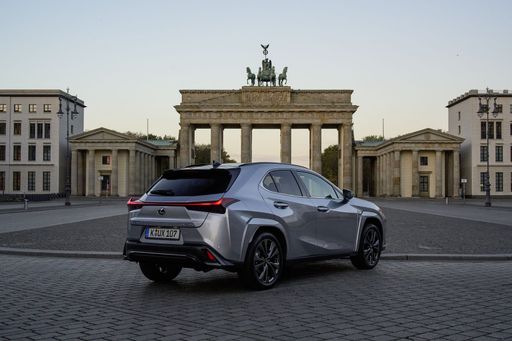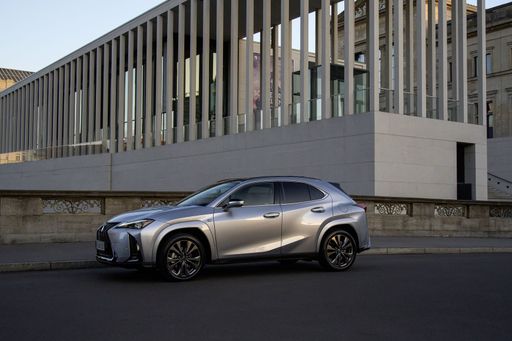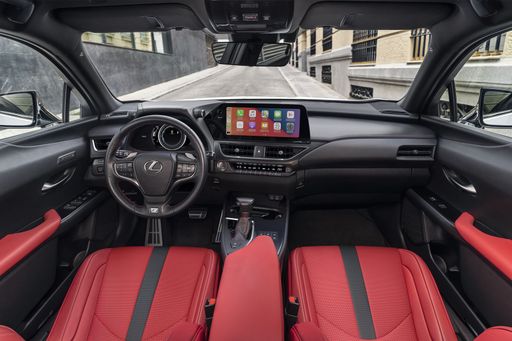Lexus UX vs Toyota Yaris Cross - Differences and prices compared
Compare performance (199 HP vs 130 HP), boot space and price (37900 £ vs 23700 £ ) at a glance. Find out which car is the better choice for you – Lexus UX or Toyota Yaris Cross?
Costs and Efficiency:
Price and efficiency are often the first things buyers look at. Here it becomes clear which model has the long-term edge – whether at the pump, the plug, or in purchase price.
Toyota Yaris Cross has a clearly advantage in terms of price – it starts at 23700 £ , while the Lexus UX costs 37900 £ . That’s a price difference of around 14237 £.
Fuel consumption also shows a difference: Toyota Yaris Cross manages with 4.50 L and is therefore a bit more efficient than the Lexus UX with 5 L. The difference is about 0.50 L per 100 km.
Engine and Performance:
Under the bonnet, it becomes clear which model is tuned for sportiness and which one takes the lead when you hit the accelerator.
When it comes to engine power, the Lexus UX has a distinct edge – offering 199 HP compared to 130 HP. That’s roughly 69 HP more horsepower.
In acceleration from 0 to 100 km/h, the Lexus UX is evident quicker – completing the sprint in 7.90 s, while the Toyota Yaris Cross takes 10.70 s. That’s about 2.80 s faster.
In terms of top speed, the Lexus UX performs minimal better – reaching 177 km/h, while the Toyota Yaris Cross tops out at 170 km/h. The difference is around 7 km/h.
Space and Everyday Use:
Cabin size, boot volume and payload all play a role in everyday practicality. Here, comfort and flexibility make the difference.
Both vehicles offer seating for 5 people.
In curb weight, Toyota Yaris Cross is distinct lighter – 1180 kg compared to 1495 kg. The difference is around 315 kg.
In terms of boot space, the Toyota Yaris Cross offers a bit more room – 397 L compared to 320 L. That’s a difference of about 77 L.
In maximum load capacity, the Lexus UX performs slightly better – up to 1231 L, which is about 134 L more than the Toyota Yaris Cross.
When it comes to payload, Lexus UX somewhat takes the win – 615 kg compared to 510 kg. That’s a difference of about 105 kg.
Who wins the race in the data check?
The Lexus UX holds a decisive overall lead in the objective data comparison.
This result only shows which model scores more points on paper – not which of the two cars feels right for you.
Costs and Consumption
View detailed analysis
Engine and Performance
View detailed analysis
Dimensions and Body
View detailed analysis

Lexus UX
Lexus UX
The Lexus UX is a compact luxury crossover that blends sharp styling with a quiet, comfortable cabin, perfect for urban buyers who want premium feel without shouting about it. It rides with poise, serves up plush materials and thoughtful tech, and—while it won’t satisfy anyone chasing track thrills—it's a smart, stylish choice for everyday driving.
details



Toyota Yaris Cross
The Toyota Yaris Cross takes the jaunty personality of the Yaris and gives it a taller stance and a bit more practicality, so you get city-friendly agility with added SUV presence. It’s easy to live with, economical on the daily grind, and smartly packaged — a sensible pick for buyers who want fuss-free transport with a touch of character.
details






Costs and Consumption |
|
|---|---|
|
Price
37900 - 54100 £
|
Price
23700 - 34300 £
|
|
Consumption L/100km
5 - 5.6 L
|
Consumption L/100km
4.5 - 4.8 L
|
|
Consumption kWh/100km
-
|
Consumption kWh/100km
-
|
|
Electric Range
-
|
Electric Range
-
|
|
Battery Capacity
-
|
Battery Capacity
-
|
|
co2
113 - 127 g/km
|
co2
101 - 108 g/km
|
|
Fuel tank capacity
43 L
|
Fuel tank capacity
36 L
|
Dimensions and Body |
|
|---|---|
|
Body Type
SUV
|
Body Type
SUV
|
|
Seats
5
|
Seats
5
|
|
Doors
5
|
Doors
5
|
|
Curb weight
1495 - 1555 kg
|
Curb weight
1180 - 1290 kg
|
|
Trunk capacity
283 - 320 L
|
Trunk capacity
320 - 397 L
|
|
Length
4495 mm
|
Length
4180 mm
|
|
Width
1840 mm
|
Width
1765 mm
|
|
Height
1540 mm
|
Height
1595 mm
|
|
Max trunk capacity
1194 - 1231 L
|
Max trunk capacity
1097 L
|
|
Payload
555 - 615 kg
|
Payload
485 - 510 kg
|
Engine and Performance |
|
|---|---|
|
Engine Type
Full Hybrid
|
Engine Type
Full Hybrid
|
|
Transmission
Automatic
|
Transmission
Automatic
|
|
Transmission Detail
CVT
|
Transmission Detail
CVT
|
|
Drive Type
Front-Wheel Drive, All-Wheel Drive
|
Drive Type
Front-Wheel Drive, All-Wheel Drive
|
|
Power HP
199 HP
|
Power HP
116 - 130 HP
|
|
Acceleration 0-100km/h
7.9 - 8.1 s
|
Acceleration 0-100km/h
10.7 - 11.3 s
|
|
Max Speed
177 km/h
|
Max Speed
170 km/h
|
|
Torque
-
|
Torque
-
|
|
Number of Cylinders
4
|
Number of Cylinders
3
|
|
Power kW
146 kW
|
Power kW
85 - 96 kW
|
|
Engine capacity
1987 cm3
|
Engine capacity
1490 cm3
|
General |
|
|---|---|
|
Model Year
2025
|
Model Year
2024 - 2025
|
|
CO2 Efficiency Class
C, D
|
CO2 Efficiency Class
C
|
|
Brand
Lexus
|
Brand
Toyota
|
Is the Lexus UX offered with different drivetrains?
Available configurations include Front-Wheel Drive or All-Wheel Drive.




